 The bill would order a review by OPM and DoD of “regional disparities that impact recruitment and retention of federal employees in defense-related roles” and invite proposals for changes in those methods. Image: Bumble Dee/Shutterstock.com
By: FEDweek Staff
The bill would order a review by OPM and DoD of “regional disparities that impact recruitment and retention of federal employees in defense-related roles” and invite proposals for changes in those methods. Image: Bumble Dee/Shutterstock.com
By: FEDweek StaffThe Senate Armed Services Committee in approving its version of the annual DoD authorization bill raised several concerns about staff levels and personnel policies at the department.
In the most sweeping provision, the bill would prevent any funds “from being used to reduce the work force at public shipyards,” but it also raises concerns about staffing in other areas, particularly high-demand positions in cybersecurity.
For example, the committee cited the importance of the Defense Cyber Service Academy scholarship program, which provides tuition-free education to students in exchange for a commitment to serve in D0D or intelligence community cybersecurity roles. “The committee is concerned that despite the President’s memorandum on the hiring freeze including an exception for positions related to national security, a hiring freeze remains in place for key cyber and science and technology roles,” says the committee report on the bill.
“The Department has informed the committee that without a hiring exemption the Department’s only course of action is to forgive graduates’ service commitments and forgive any payback. The continued hiring freeze therefore risks wasting significant taxpayer money and ensures that key national security roles remain unfilled,” it says.
It also asks for information on the hiring of graduates of that program and several other scholarship programs with similar purposes, and would expand several “direct hire” authorities for hard-to-fill positions at the department.
The committee meanwhile said that the system for allocating locality-based federal raises “may not adequately account for the evolving economic and labor conditions that affect federal employees, particularly those in regions experiencing significant economic growth and rising costs of living. The existing system may rely on outdated methodologies that do not fully capture regional cost-of- living differences or emerging workforce trends.”
“The committee is concerned that limitations in the current locality pay system have led to recruitment and retention challenges in critical mission areas, including national security and defense-related functions,” it says.
The bill would order a review by OPM and DoD of “regional disparities that impact recruitment and retention of federal employees in defense-related roles” and invite proposals for changes in those methods. Locality pay rates at DoD are the same as at other agencies; a review there would carry implications for the program in general.
The measure however does not contain language in the House version to prohibit the DoD from carrying out President Trump’s order stripping most employees of their union representation rights on national security grounds. Differences between them would have to be resolved in a conference following passage by each chamber of their respective versions.
Both versions of the bill meanwhile would continue several long-running special pay authorities for federal employees assigned overseas to areas of military operations.
Key Bills Advancing, but No Path to Avoid Shutdown Apparent
TSP Adds Detail to Upcoming Roth Conversion Feature
White House to Issue Rules on RIF, Disciplinary Policy Changes
DoD Announces Civilian Volunteer Detail in Support of Immigration Enforcement
See also,
How Do Age and Years of Service Impact My Federal Retirement
The Best Ages for Federal Employees to Retire
How to Challenge a Federal Reduction in Force (RIF) in 2025
Should I be Shooting for a $1M TSP Balance? Depends…
FERS Retirement Guide 2025 – Your Roadmap to Maximizing Federal Retirement Benefits

